|
|
|
Sort Order |
|
|
|
Items / Page
|
|
|
|
|
|
|
| Srl | Item |
| 1 |
ID:
119259
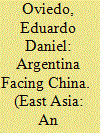

|
|
|
|
|
| Publication |
2013.
|
| Summary/Abstract |
The article explains the Argentine-Chinese economic relations and identifies the interest's network with the ongoing modernization processes in both countries. It can be observed that harmony is more important than discord when Argentina accepts the new China's international division of labor, but when Argentina tends to consolidate the process of economic de-primarization, tensions between both countries tend to emerge. The crisis about crude soybean oil in 2010 is the clearest example to illustrate that trade tensions between both countries will be most frequent if Argentine industrialization continues and the process of policy coordination fails.
|
|
|
|
|
|
|
|
|
|
|
|
|
|
|
|
| 2 |
ID:
186518
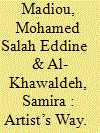

|
|
|
|
|
| Summary/Abstract |
While critics take a particular interest in discussing Mohsin Hamid as a novelist of globalization, migration, war, politics, economics, and capitalism, I contend that Hamid manifests a strong interest in, even obsession with, art in his fiction and non-fiction, which also makes him a novelist of art. Relying on his own words in his non-fiction, I argue that Hamid expresses a direct, often indirect concern about his artistic life, which includes his artistic experiences, ways, pursuits, and struggles in the globalized world of art. This article aims to ground my obstinate claim that Hamid symbolically exposes his own artistic life in his fiction in reality; it does this by focusing on Hamid’s non-fiction where his personal confessions can be said to be the most pronounced in contrast to his fiction where these are symbolic and, therefore, less definite. It establishes the basis on which my subsequent claim that Hamid speaks about his artistic experiences in his fiction can stand and, by extension, the claim that his fiction, besides being metafictional, can also be considered autobiographical.
|
|
|
|
|
|
|
|
|
|
|
|
|
|
|
|
| 3 |
ID:
155273
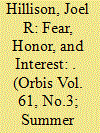

|
|
|
|
|
| Summary/Abstract |
The “America First” approach to foreign policy represents an opportunity to reassess relations with Russia. Efforts to deter Russian aggression have failed. Perhaps a new approach is needed. This article uses the lessons of the Peloponnesian War to help guide the West’s approach to Russia. By examining the three motivations for warfare—fear, honor and interest—it is possible to craft a more effective deterrent strategy while avoiding a security dilemma. Current approaches have discounted legitimate Russian fears of NATO and EU encroachment. They also have neglected the role of honor in Russia’s actions and how this impulse frames Moscow’s views of the West. Finally, NATO and the EU have lost sight of Russia’s vital interests in pursuing further eastward expansion. Where the West cannot compromise is on the security of NATO and EU members and the unity of the Trans-Atlantic alliance.
|
|
|
|
|
|
|
|
|
|
|
|
|
|
|
|
| 4 |
ID:
087063
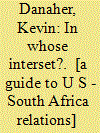

|
|
|
|
|
| Publication |
Washington, Institute for policy studies, 1984.
|
| Description |
279p.
|
|
|
|
|
|
|
|
|
|
|
|
Copies: C:1/I:0,R:0,Q:0
Circulation
| Accession# | Call# | Current Location | Status | Policy | Location |
| 028376 | 332.73068/DAN 028376 | Main | On Shelf | General | |
|
|
|
|
| 5 |
ID:
179583
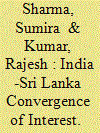

|
|
|
|
|
| Summary/Abstract |
In the recent years, shadow of ‘dragon head’ is making swift moves in South Asia that has traditionally been considered India’s area of influence. To counter China in South Asia, India has launched neighbourhood first policy followed by ‘ACT EAST’ initiative; Sri Lanka was part of both. Even COVID 19 has provided India an opportunity to regain, some hold on the lost ground, especially in South Asian countries like Sri Lanka. This paper tries to analyse the possibility of India-Sri Lanka convergence of interest in the light of recent policy decisions and incidents.
|
|
|
|
|
|
|
|
|
|
|
|
|
|
|
|
| 6 |
ID:
134132
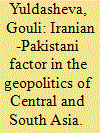

|
|
|
|
|
| Publication |
2014.
|
| Summary/Abstract |
The author has chosen Iran and Pakistan, two giants of the Muslim world, as the subject of her analysis and identifies their place in the context of the geopolitical changes underway in Central and South Asia. She investigates in detail the degree to which their interests are intertwined, as well as the extent of their interaction with other actors (the U.S., Russia, China, India, Saudi Arabia, Afghanistan, and the Central Asian republics).
She also points to the potentially useful factors that might eventually help to overcome all the challenges, risks, and threats that, so far, remain prominent enough to slow down progress in the relations between Iran and Pakistan. The talks between the West and Iran, which have been going on far too long and complicated by the Ukrainian crisis and the rapidly approaching NATO drawdown from Afghanistan, are further destabilizing the already destabilized situation in the AfPak zone. This negatively affects the relations between the two countries, their potential impact on the Central Asian region, and the prospects for the geoprojects related to them.
|
|
|
|
|
|
|
|
|
|
|
|
|
|
|
|
| 7 |
ID:
095122
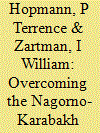

|
|
|
|
|
| Publication |
2010.
|
| Summary/Abstract |
Six authors of the younger generation - three from Armenia and three from Azerbaijan - examine the conflict over Nagorno-Karabakh in a joint effort to overcome their heritage of stereotypes and hostility. While their proposals vary, there is some creative overlap, and all of them recognize the obstacles as four standard characteristics of intractable conflicts: no salient solution, no ripeness, profitability, and no Zone of Possible Agreement (ZOPA). From these obstacles stem some ideas for creative progress, if not immediate solutions.
|
|
|
|
|
|
|
|
|
|
|
|
|
|
|
|
| 8 |
ID:
107163
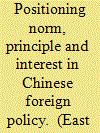

|
|
|
|
|
| Publication |
2011.
|
| Summary/Abstract |
There are different driving forces behind Chinese foreign policy decision-making. Norms, principles, and interests and the subtle combinations of them, I argue in this paper, are the major driving forces on the input side, while the domestic situation of a specific country and international pressure undercut China's policy deliberations. By contrast, the form of government of a specific country under discussion is not an important variable. In this paper, I use China's policy toward Myanmar as a case study. The findings prove that the integration of norms, principle and practical interests has formed the powerful impetus that drives China's policies toward Myanmar. Among these factors, the interests China has identified in general and stability on its "doorstep" in particular play a dominant role, while the norm of human security and the principle of non-interference are embedded in its policy deliberations.
|
|
|
|
|
|
|
|
|
|
|
|
|
|
|
|
| 9 |
ID:
107181


|
|
|
|
|
| Publication |
2011.
|
| Summary/Abstract |
There are different driving forces behind Chinese foreign policy decision-making. Norms, principles, and interests and the subtle combinations of them, I argue in this paper, are the major driving forces on the input side, while the domestic situation of a specific country and international pressure undercut China's policy deliberations. By contrast, the form of government of a specific country under discussion is not an important variable. In this paper, I use China's policy toward Myanmar as a case study. The findings prove that the integration of norms, principle and practical interests has formed the powerful impetus that drives China's policies toward Myanmar. Among these factors, the interests China has identified in general and stability on its "doorstep" in particular play a dominant role, while the norm of human security and the principle of non-interference are embedded in its policy deliberations.
|
|
|
|
|
|
|
|
|
|
|
|
|
|
|
|
| 10 |
ID:
112238
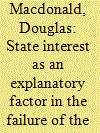

|
|
|
|
|
| Publication |
2012.
|
| Summary/Abstract |
Despite its prominence in the policy discourse, countries of the world have not adopted soft-path energy policy. Current explanations of this failure look to the nature of different fuels, various barriers in the market and political opposition by hard-path energy industries. Such factors provide only partial explanation. The explanation is incomplete because those factors cannot explain the larger subject of the evolution of fuel types during the past two hundred years. For that, we must add the role of the state, through ownership and regulation, in energy generation. That role has expanded regularly with the evolution of fuel types from coal to oil, electricity and nuclear power, but not with the introduction of new renewables in the 1970s. That pattern is explained by the inherent interest of the state in the use of energy for physical, military force and the fact that new renewables have not had immediate military applications. Although renewable energy is increasing, unless the state is motivated for military reasons to play a greater role, the soft-path vision will continue to languish.
|
|
|
|
|
|
|
|
|
|
|
|
|
|
|
|
|
|
|
|
|